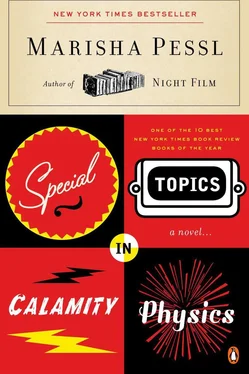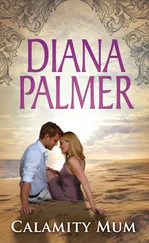“What is it?” He stepped toward me, his face again soaked in the harmless yellow light of the rest of the room.
“I have a stomachache,” I said abruptly, and then turned, ran upstairs to my room and pulled from the shelf an old paperback, Souls for Sale: Unveiling John Doe Sociopath (Burne, 1991). Dad himself had picked it up for me at some psychology professor’s pre-retirement garage sale. I actually flipped through all of Chapter 2, “Character Sketch: A Lack of Connection in Romantic Relationships,” and parts of Chapter 3, “Two Missing Pieces: Scruples and a Conscience,” before I realized how hysterical and foolish I was. While it was true that Dad displayed a “marked disregard for others’ feelings” (p. 24), could “charm the pants off people” (p. 29), and wasn’t “concerned with the moral codes of society” (p. 5), he did “love things other than himself” (p. 81) or the “splendid sage he saw whenever he regarded himself in the bathroom mirror” (p. 109): my mother and, of course, me.
Princeton professor and leading sociologist Dr. Fellini Loggia made the somewhat gloomy statement in The Imminent Future (1978) that nothing in life is authentically astonishing, “not even being struck by lightning” (p. 12). “A person’s life,” he writes, “is nothing more than a series of tip-offs of what’s to come. If we had the brains to notice these clues, we might be able to change our futures.”
Well, if my life had a hint, a whisper, a cute, well-placed clue, it was when I was thirteen and Dad and I moved to Howard, Louisiana.
While my nomadic life with Dad might sound daring and revolutionary to the outside observer, the reality was different. There is a disturbing (and wholly undocumented) Law of Motion involving an object traveling across an American interstate, the sense that, even though one is careening madly forward, nothing is actually happening. To one’s infinite disappointment, one always arrives at Point B with energy and all physical characteristics wholly unchanged. Every now and then, at night, before I fell asleep, I found myself staring at the ceiling, praying for something real to happen, something that would transform me — and God always took on the personality of the ceiling at which I was staring. If the ceiling was imprinted with moonlight and leaves from the window, He was glamorous and poetic. If there was a slight tilt, He was inclined to listen. If there was a faint water stain in the corner, He’d weathered many a storm and would weather mine too. If there was a smear cutting through the center by the overhead lamp where something with six or eight legs had been exterminated via newspaper or shoe, He was vengeful.
When we moved to Howard, God answered my prayers. (He turned out to be smooth and white, otherwise, surprisingly unremarkable.) On the long, dry drive through Nevada’s Andamo Desert, listening to a book-on-tape, Dame Elizabeth Gliblett reading in her grand ballroom of a voice The Secret Garden (Burnett, 1909), I offhandedly mentioned to Dad that none of the houses we rented ever had a decent yard, and so, the following September when we arrived in Howard, Dad chose 120 Gildacre Street, a worried house of pale blue stranded in the middle of a tropical biosphere. While the rest of Gildacre Street cultivated prim peonies, dutiful roses, placid yards plagued only by the rare clump of crabgrass, Dad and I fought escalating plant life indigenous to the Amazon Basin.
Every Saturday and Sunday for three weeks, armed with nothing but pruning shears, leather gloves and Off, Dad and I rose early and trekked deep into our rain forest in a heroic attempt to scale back the growth. We’d rarely last two hours, sometimes less than twenty minutes if Dad happened to spot what was allegedly a Stag Beetle the size of his foot scuttling under the leaves of a talipot palm (men’s size 12).
Never one to admit defeat, Dad attempted to rally the troops with “Nothing defeats the Van Meers!” and “You think if Patton lived here, he’d throw in the towel?” until that fateful morning he was mysteriously bitten by something ( “Ahhhhhhh!” I heard him cry from the front porch, where I was trying to curtail knotted liana.). His left arm inflated to the size of a football. That evening, Dad answered an advertisement of an experienced gardener in The Howard Sentinel .
“Yardwork,” it read. “Anyhow. Anywhere. I do.”
His name was Andreo Verduga, and he was the most beautiful creature I’d ever seen (see “Panther,” Glorious Predators of the Natural World , Goodwin, 1987). He was tan, with black hair, gypsy eyes and, from what I could deduce from my upstairs bedroom window, a torso smooth as a river rock. He was from Peru. He wore heavy cologne and spoke in the language of an old-fashioned telegram.
HOW YOU DO STOP NICE DAY STOP WHERE IS HOSE STOP
Every Monday and Thursday at four o’clock, I’d procrastinate working on my French compositions or Algebra III and spy on him working, though most of the time he didn’t work so much as hang out, chill, loiter, loaf, enjoy a laid-back cigarette in a scarce patch of sun. (He always threw the stub in a clandestine place, tossing it behind a bromeliad or into a dense section of bamboo without even making sure it was extinguished.) Andreo really only started working two to three hours after his arrival, when Dad came home from the university. With an array of showy gestures (heavy panting, wiping his brow), he’d then push the lawnmower ineffectively along the forest floor, or prop up the wooden stepladder on the side of the house in a futile attempt to hack back the canopy. My favorite observation was when Andreo muttered to himself in Spanish after Dad confronted him, demanding to know exactly why the knotted liana was still creating a Greenhouse Effect on the back porch, or why a brand new crop of strangler figs now lined the back of our property.
One afternoon I made sure I was in the kitchen when Andreo slipped inside to steal one of my orange push pops from the freezer. He looked at me shyly and then smiled, revealing crooked teeth.
YOU DON’T MIND STOP I EAT STOP BAD BACK STOP
In the Howard Country Day library during lunch, I consulted Spanish textbooks and dictionaries and taught myself what I could.
Me llamo Azul.
My name is Blue.
El jardinero, Mellors, es una persona muy curiosa.
The gamekeeper, Mellors, is a curious kind of person.
¿Quiere usted seducirme? ¿Es eso que usted quiere decirme?
Would you like me to seduce you? Is that what you’re trying to tell me?
¡Nelly, soy Heathcliff!
Nelly, I am Heathcliff!
I waited in vain for Pablo Neruda’s Twenty Love Songs and a Song of Despair (1924) to be returned to the library. (The Girlfriend Who Wore Nothing But Tight Tank Tops had checked it out and lost it at the Boyfriend Who Should Shave Those Gross Hairs on His Chin’s.) I was forced to steal a copy from the Spanish room and fitfully memorized XVII, wondering how I’d ever find the courage to do The Romeo, publicly proclaim those words of love, shout them so loudly that the sound had wings and carried itself up to balconies. I doubted I could even handle The Cyrano, writing the words on a card, signing someone else’s name and covertly dropping it through the cracked window of his truck while he lounged in the backyard reading ¡Hola! under the rubber trees.
As it turned out, I did neither The Romeo nor The Cyrano.
I did The Hercules.
At approximately 8:15 P.M. on a brisk Wednesday night in November, I was upstairs in my room studying for a French test. Dad was at a faculty dinner in honor of a new dean. The doorbell rang. I was terrified and immediately imagined all kinds of wicked Bible salesmen and bloodthirsty misfits (see O’Connor, The Complete Stories , 1971). I darted into Dad’s room and peered through the window in the corner. To my astonishment, in the nightplum darkness, I saw Andreo’s red truck, though he’d driven clear off the driveway into a dense cluster of violin ferns.
Читать дальше












